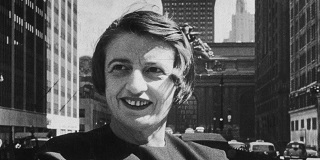Our Understanding of Humankind’s Relation To the Environment Has Changed Significantly–Thank The Lord
A young reader who happens to follow a “modern” religion (one that saw its origins in the mid-20th Century) comments on this post and the environmental “lens” through which I tend to view the world: Where I am optimistic is that we can do something to wake up the spiritual beings that have long gone to slumber and have started accepting the planet and their surroundings as something they have to adjust to. My job is to get people to start functioning as they should, adjusting their environment to them.
Personally, I believe that the viewpoint that man should adjust the environment to him was a function of the time in which the founder of your religion lived. These were days when Ayn Rand (pictured) was a well-respected philosophic thinker. You’re probably too young to have studied anything about her, but her essential principle was that self-interest is the only moral imperative and that altruism is derived from low-integrity people who wish to enslave us. This is summed up in her book “The Virtue of Selfishness.” The title says it all.
To be blunt, outside of your group, that idea about humankind’s relationship to its environment has really shriveled up and died. Ironically, it’s in the process of being replaced by the precise inverse notion, i.e., that we need to live according to the laws of nature and act as stewards over the environment. In other words, as seminal environmental activist Wendell Berry said in 1971, “We Do Not Inherit the Earth from Our Ancestors; We Borrow It from Our Children.”
Today, we have notions (not that they’re followed too closely) like conscious capitalism, the triple bottom line (profits, people, planet), socially responsible investing, divestiture (from fossil fuels), and, most important, the idea that cleantech is destined to be the defining industry of the 21st Century, which is propounded in the most recent book of a current well-respected thinker: me. (Just kidding.)
In all fairness, I need to say that there are other key differences between the 1950s and the present day in terms of the physical nature of the planet and what we knew about it at the time. In particular, there are 3.6 times as many people on Earth now than there were then, the energy consumption per capita was a small fraction of what it is now, and (virtually) no one had any inkling of climate change. It wasn’t until the early 1960s that people started to realize that we were causing serious environmental damage, and far more recently before masses of people started to do something meaningful about it.
Hope you’re not offended.

